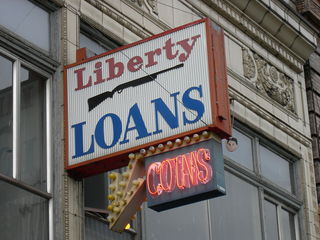
So far, so good. The first interest rate hike by the Federal Reserve in nearly a decade has been mostly shrugged off by Wall Street. The Dow Jones Average rose on the first day, meaning that investors remain bullish. For another kind of market index, drop into a pawnshop down on Main Street.
An old institution, the pawnshop. Basically, it's a place of business (usually in a less than genteel part of town) where loans are made on items of personal property. The customer is given a ticket, which is his receipt for the items pawned (or "hocked"). He may then redeem them within a certain time by repaying the loan, plus interest. If that doesn't happen, the pawnbroker is free to sell them.
What kinds of people resort to these places as a way of making ends meet? I've never had to do it myself, although such low interest rates on savings in the recent past have made it tough for seniors. Our bank accounts and CD's are earning next to nothing, and analysts are saying that it will take at least two more rate hikes to do very much about that. Will some of us be in the poorhouse (or at least the pawnshops) before that happens?
It was for a different reason altogether that I visited a pawnbroker in Seattle some years ago. As I approached the counter I noticed that the old man's attention was drawn to the heirloom diamond ring on my finger. He looked disappointed when I said I hadn't come to pawn anything. Instead, I was hoping to buy something.
I explained that I had just come back from London, where I had dropped my great old Argus C-3 camera on the hard tile floor of a Fish and Chips shop. The lens was shattered, and the clerk at a camera store when I got home only laughed at the idea that such an antique could be repaired or replaced. He wanted to sell me something modern and up-to-date, but I had used the old Argus––with its obsolete flash attachment and light meter––for decades, and didn't want any new-fangled gadget. He said I might do better at a pawnshop.
And that's how I came to be there that day. It may have been one of the years that Boeing was laying off workers and even engineers, because the place appeared to be doing a brisk business in loans on a whole array of both everyday and luxury items. Glancing around at some of the things that people had pawned, I saw guns, watches, tennis rackets, golf clubs, jewelry, luggage, musical instruments, clothing, you-name-it.
I was ushered into a back room and left to browse among scores of outdated items gathering dust––including a whole shelf of Argus C-3's––but being a playwright, I couldn't resist peeking through the door to see and hear the drama unfolding in the shop. The cast of characters included two shabby "dumpster divers," hocking bags of small items they had salvaged and hoped to turn into cash so they could eat that day. Not everyone was on skid row, I noticed. A gentleman in a Burberry raincoat, calling himself a compulsive buyer, had gone overboard and bought a matching scarf and umbrella, which he later regretted. They went up on the wall of the shop and the man pocketed a fistful of dollars. A well-dressed lady brought in a mink coat, confessing that she had lost money at the racetrack and didn't want her husband to know about it. She would come back for the coat next month. A couple of college students offered their guitars and some kind of drug paraphernalia. The guitars were acceptable, but the other items met with scorn from the old man. A hippie girl in a tie-dye T-shirt, trying to hock an expensive wristwatch, was told the place did not deal in stolen goods.
After the last customer had left the shop, the proprietor and I had a chance to talk. "We see all kinds, hear a hundred different stories. Some old, some new." he told me. "Prices are high. Food and rent are out of sight. People at the top are gonna do all right in any economy. They got money in their pockets. But the folks at the bottom? They could be out of a job, or working for minimum wage, and need help making ends meet. That's when they come in here."
I selected an Argus C-3 from the dusty back room, but left with more than a camera. I had acquired a better understanding of the economy's effect on Main Street––a world away from Wall Street––and of the pawn ticket as a little-known market indicator.


